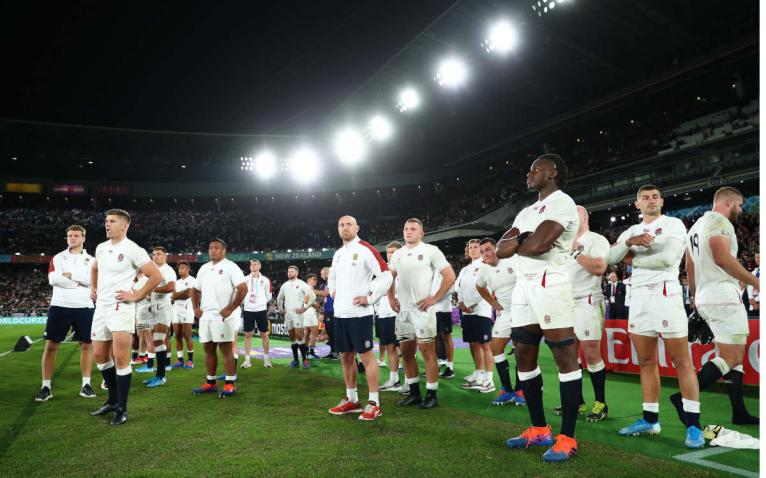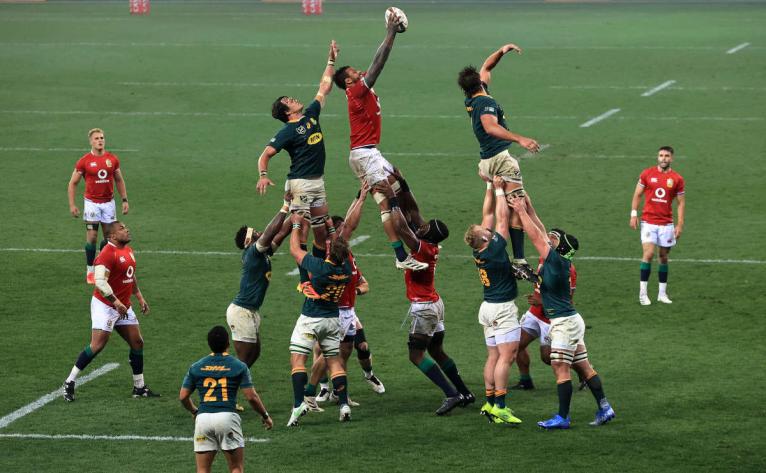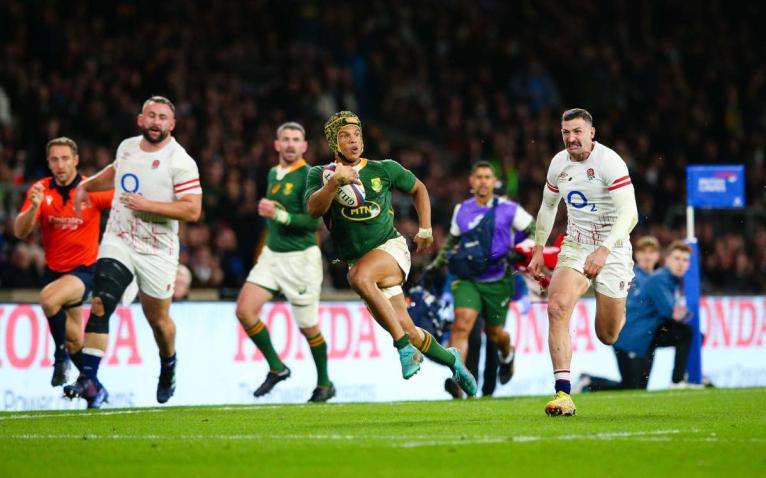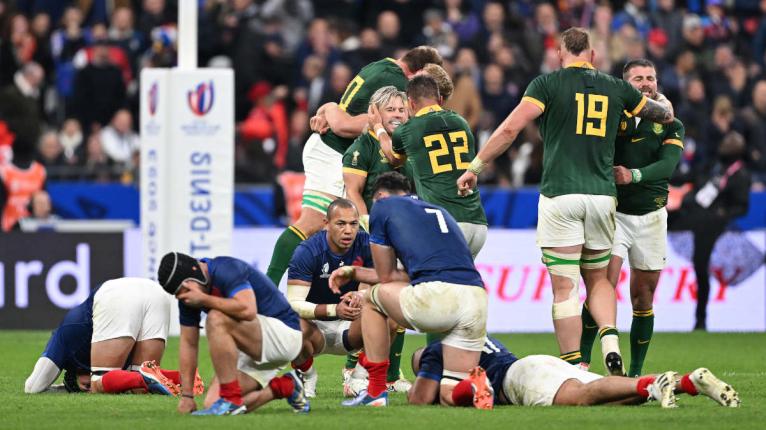The writing was on the wall in the lead-up to the 2019 World Cup final, although most refused to take the message to heart.
England’s resounding semi-final win over a great All Blacks side sent the media hype machine into overdrive. Former England and Lions scrumhalf Matt Dawson declared that none of the Springboks deserved a place in a combined XV, and over the subsequent days, phrases such as “greatest win ever”, “greatest game ever” and “greatest team ever” were used liberally across the rugby space.
Nobody was happier with that narrative than South Africa’s director of rugby Rassie Erasmus.
When the travelling media met with the Bok coaching staff at the team hotel for an informal gathering some 48 hours before kickoff, we discussed the stories of the week and England’s status as overwhelming favourites.
The Bok players were being written off and so were the South African coaches. It felt like the 2019 World Cup story was a foregone conclusion, and that the Boks would finish as a footnote.
“Let it happen,” Erasmus said with a smile. “If we execute, we will win by a comfortable margin this weekend.”
Erasmus’s prediction came to pass, as the Boks powered their way to a 32-12 victory in a largely one-sided final. The coach and Siya Kolisi were in good spirits when they arrived at the post-match press conference, and reiterated that – for them – the result had never been in doubt.

By contrast, a shell-shocked Eddie Jones couldn’t provide answers to the most pressing of questions. Had the England players choked? How had England underestimated their opponents to the extent where they’d lost by 20 points?
Later, Jones was involved in a heated exchange with journalists in the bowels of the stadium. He failed to provide clear answers, but insisted that this was not the end for his England side.
Much later, as Erasmus held court with a handful of journalists at the team hotel in Tokyo, he delivered a similar message. The World Cup triumph in Japan was not the end for this team, but the start of a much longer journey to the 2023 tournament in France.
And it is here where the next chapter of the England-South Africa epic began.
Covid KOs best-laid plans
England continued to search for answers in the subsequent months. Meanwhile, Erasmus and right-hand man Jacques Nienaber pressed on with the next phase of their six-year plan.
Shortly after being appointed as head coach in January 2020, Nienaber provided a step-by-step breakdown of the Boks’ four-year schedule. The Bok coaches planned to blood a host of new players in the games against Scotland and Georgia, which were initially scheduled for July 2020.
Nienaber spoke about the group’s desire to win the 2020 Rugby Championship, and to reclaim the Freedom Cup title via two consecutive wins against New Zealand. He wanted the team to retain the No 1 ranking, while bolstering their depth and evolving the game plan in the lead-up to the 2021 series against the British and Irish Lions.
The Covid-19 pandemic put paid to those ambitions, as the high rate of infections in South Africa and the resultant travel restrictions forced the Boks into a year-long hiatus.
Just like that, 12 Tests were wiped from their schedule, and this would have negative consequences for South Africa’s long-term preparations for the 2021 Lions series and, to an extent, the 2023 World Cup.
While no nation was left untouched by the pandemic, most of the tier-one nations still had the opportunity to compete. England and New Zealand rebounded from their respective World Cup disappointments to win the 2020 Six Nations and Tri-Nations. Meanwhile, France and Ireland continued to rise.
The Boks retained the No 1 ranking in spite of their Covid-enforced absence. Eighteen months elapsed, however, before the World Cup-winners played their first Test against Georgia.
The squad was further compromised by a Covid outbreak in the lead-up to the Lions series, and the players went into the Test matches woefully underdone. Somehow they managed to lift themselves for the occasion, and went on to win a fiercely contested series 2-1.

Many will remember the tour for what transpired in the wake of the first Test, which the visitors won 22-17. A number of calls went against the Boks, and Erasmus responded by sending an hour-long breakdown of referee Nic Berry’s decisions to World Rugby.
The video was leaked, and while many in South Africa praised Erasmus for highlighting Berry’s mistakes, the wider rugby community took exception to his methodology. After being celebrated as the game’s heroes in 2019, Erasmus’s Boks were recast as the sport’s villains.
On the field, the Boks were in survival mode. Plans to develop the squad and the game plan were shelved as they went in search of morale-boosting results during the 2021 Rugby Championship. They lost two matches against the Wallabies in Australia, as well as their 100th match against the All Blacks. They rallied to win the final battle against New Zealand, but won few fans with their kicking tactics.
They travelled to the United Kingdom that November needing three consecutive wins to save their season. The finale against England was touted as a make-or-break fixture.
Convincing wins against Wales and Scotland did little to alleviate the pressure. In the lead-up to the game at Twickenham, World Rugby handed down its judgement on Erasmus, and he was banned from attending matches for 12 months.
This decision added yet another edge to the game, which was billed as a replay of the 2019 World Cup final as well as England’s shot at redemption. The bitter atmosphere around the 2021 Lions series encouraged Irish, Scottish and Welsh fans to get behind Jones’s side. For one day, it was a case of “Anyone but the Boks”.
Marcus Smith slotted a last-minute penalty to give England a 27-26 win. The result allowed Jones to finish a poor year on a winning note, and provided some consolation for Lions fans.
The Bok coaches and players were inconsolable after that loss. After an immensely challenging year on and off the field, they had fought back to win three matches in a succession. The defeat at Twickenham stalled their momentum, and prompted many to question their quality and whether they would be contenders for the title at the 2023 World Cup.
Paths diverge in 2022
With the Lions series out of the way, Nienaber revisited the development plan intended for 2020, and started to rotate his squad across the series against Wales and in the subsequent Rugby Championship.
The Bok coaches stuck to their task, in spite of disappointing one-off losses to Wales, New Zealand and Australia. When they departed for Europe in November 2022, the team appeared to be in a better place regarding their depth and approach.
By contrast, England continued to decline over the course of the 2022 season. Three Six Nations defeats were followed by a loss to Argentina and a dispiriting draw with the All Blacks in the Autumn Nations series. They went into the final clash of 2022 with something to prove.
Having enjoyed a less disruptive buildup to the 2022 season, the Bok players were in a better physical and mental space. Few expected them to challenge the better European teams, yet they pushed Ireland close in Dublin, and came within a score of beating France in Marseille.
The battle with England was viewed by the players and coaches as another make-or-break in the context of their season. They thrashed England 27-13 to claim their first win at Twickenham in eight years, and were universally praised for their bold and balanced approach – as a searing counter-attack from deep culminated in an unforgettable try for rookie winger Kurt-Lee Arendse.
The Boks coaches went into 2023 with credit in the bank, and the critics and fans reacted positively after the team was heavily rotated across the Rugby Championship and World Cup warm-ups.

They claimed a record 35-7 win against the All Blacks at Twickenham, and rode the momentum of that victory into the global tournament. While they fell short against Ireland in one of the toughest games of the pool stage, they prevailed in a fierce and expansive battle against hosts France in the quarter-finals.
For England as well as the Boks, the result at Twickenham in 2022 marked another turning point.
If England had won that game, Jones would have continued to lead the team through to the 2023 World Cup. Perhaps that group would have shown signs of progress and peaked at the tournament in France, or perhaps they would have continued to make the same mistakes.
The decision to axe Jones less than a year out from the World Cup surprised many in the global rugby community. Incoming coach Steve Borthwick was handed the monumental task of rebuilding England in a matter of months before the most important competition in the four-year cycle.
England lost three games in the 2023 Six Nations, and registered their first loss to Fiji at Twickenham on the eve of the World Cup. They travelled to the global tournament as dark horses, and won all of their pool matches in spite of their unconvincing and occasionally disjointed performances.
Had a couple of decisions gone against them, England may have lost to Samoa, and may have gone down to Fiji in the quarter-finals.
Have the roles been reversed?
Which brings us to the semi-final at the Stade de France this Saturday. At a glance, it may appear as if the roles have been reversed, with the favourites ahead of the 2019 final now occupying the tag of underdogs.
Are the situations really that similar, though?
The Boks’ World Cup win in 2019 was a surprise, but only in the context of that what had transpired across that four-year cycle. They suffered a series of record defeats across the 2016 and 2017 seasons, and dropped to seventh in the World Rugby rankings as a result.
Across the 2018 and 2019 seasons, however, they managed to beat the All Blacks in New Zealand and win the Rugby Championship. They secured that southern-hemisphere title in the weeks leading up to the 2019 World Cup in Japan, and travelled to that tournament with plenty of confidence and momentum.
While the Boks lost to New Zealand in their opening game, they stuck to the plan in the next series of matches against Namibia, Italy and Canada. They overcame Japan in the quarters, and emerged from a gruelling battle with Wales in the semis.
When one reflects on those results, one wonders why England didn’t show a battle-hardened Bok outfit more respect in the lead-up to the final. South Africa were hiding in plain sight for the duration of that World Cup campaign and, as Erasmus himself later clarified, did not change their tactics for the decider.
Now, consider where the two sides stand on the brink of yet another watershed match.
Over the course of this week, the England coaches and players have spoken about embracing their status as underdogs. There’s been a suggestion that they’re on the brink of a result and performance that will atone for their previous failures.

Unlike the Boks of 2019, however, England haven’t claimed any meaningful wins in the lead up to this semi-final, and have no concrete reason to believe a victory against one of the world’s leading sides is in the offing.
Are they hoping to catch and punish a complacent Bok side, who may have one eye on a potential meeting with the All Blacks in the final? Probably, but the Boks have no reason to be complacent, and won’t want for motivation ahead of this particular encounter.
Most of the Bok players and coaches who featured in the 2019 campaign have returned for a second crack at the title in 2023. They will be talking about the dangers of complacency this week, and may be using the England side of 2019 as an example of what might happen if individuals drop their guard.
There’s always an extra edge around England-South Africa matches, given the history between the two nations. We’re unlikely to see the Boks holding much back – at least in terms of intensity and physicality – when they meet the old foe this Saturday.
There is plenty to gain by beating England – such as a place in the decider, and an opportunity to make history as the first South African side to win back-to-back titles. For the players and coaches who have decided to move on after this tournament, this is a key moment in the story.



So lucky to be in Final!!!
England was a better team yesterday. France was a better but ref idn't do his job. Hopefully we have a clean game in Final. Go AB.
2019 is in the past. NO WAY you can draw comparison. The Boks are actually a far better side than 2019 & England have gone through tough times, which might have made them stronger mentally?
I see kicking game coming from England. Hence Fredeie Steward.
The only problem for them is, that MAY lead to set pieces. I’m not saying England doesn’t have a strong set piece but the Boks actually enjoy the scrum/lineout. It’s bread & butter & if they get front foot ball from there - it’s gonna be tickets for England.
The Springboks will come out and stick to what they do to get the win. Can England bring anything new to the party that the Irish and the French did not? They might targer the 10 channel and the linout. Maybe they will target the ruck but that is about it other than kick and pray. South Africa really has to have an off day to lose this one but we might yet again see another game plan from the Springboks.
Given the surprise team selection, SA is taking the game and opponents very seriously. Still a pity for me that better teams are home already, and England haven't been tested. If they had a proper clash in the pool or QFs, it would have given us something to measure them against.
“Unlike the Boks of 2019, however, England haven’t claimed any meaningful wins in the lead up to this semi-final”
Well - they beat Argentina who are also now semi-finalists. In 2019 I guess South Africa beat Japan and Wales, but they also lost to New Zealand. Probably South Africa did go into the 2019 final in better form than England are in now, but the difference isn’t particularly stark.